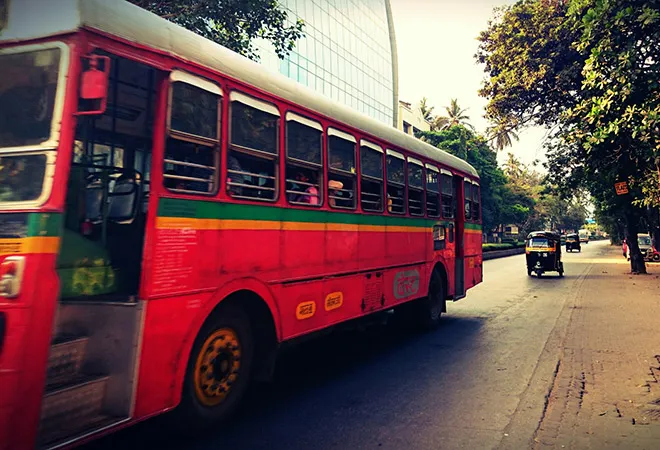
The recent announcement by the newly-appointed Municipal Commissioner of Mumbai, Mr. Praveen Pardeshi to provide financial assistance to the ailing Brihanmumbai Electric Supply and Transport Undertaking (BEST) of INR 100 crore per month has been received with great excitement by all public transport enthusiasts in Mumbai. However, it is also reminiscent of Robert T. Kiyosaki’s famous quote from his book ‘Rich Dad Poor Dad’: “There is a difference between being poor and being broke. Broke is temporary. Poor is eternal.” Kiyosaki explains that if a son comes out of his current financial misery using the loan given by his dad, he then has a ‘rich dad’; but if the son remains eternally poor and dependent on his dad’s loan, his dad then is a ‘poor dad’.
This quote becomes relevant in the context of the recent bailout announced by the MCGM Commissioner for BEST, given that the Undertaking incurs a loss of INR 858.01 crore every year, which translates to an astronomical amount of INR 2.35 crore daily. Besides, the BEST Undertaking also has other outstanding dues amounting to INR 2,600 crore which needs to be paid back. The accumulated losses clearly reflect BEST’s inability to put its resources to optimum use. Additionally, the MCGM commissioner also proposed to lease out 3,000 additional buses for BEST, which is expected to not only increase its operational efficiency, but also save INR 550 crore for the Undertaking each year.
The BEST Undertaking incurs a loss of INR 858.01 crore every year, which translates to an astronomical amount of INR 2.35 crore daily. Besides, the Undertaking also has other outstanding dues amounting to INR 2,600 crore which needs to be paid back.
While the financial assistance has come at a critical time and will provide BEST the backbone needed to straighten itself out, it is not a panacea for its overall poor financial health. As pointed out by Mumbai’s new civic chief, public transportation as a service is subsidised all over the world. In that context, this financial aid is a step in the right direction. However, the question is should the MCGM bear all the losses that BEST incurs or just the ‘Justified Losses’? The justified losses should include the losses which BEST incurs due to operating in economically non-viable routes, subsided ticket rates, increase in maintenance cost or any such activity beyond the control of the BEST management. It should not, however, bear the losses which are a result of inefficient resource management. Even Transport for London (TfL), which is globally considered to be one of the most efficient public transportation services, incurred a net loss of £752 million in the FY 2017-2018. Interestingly, TfL doesn’t call this a “loss”. Instead, the deficit is shown as an integral part of the system’s “net cost of service”. These losses which arise out of service to the public are justifiable and should be subsidised, what isn’t justifiable are the losses that arise of inefficient management and under-utilisation of assets.
While the financial assistance has come at a critical time and will provide BEST the backbone needed to straighten itself out, it is not a panacea for its overall poor financial health.
While announcing this financial aid the new chief put in a word of caution by saying that BEST must look at ways to increase its efficiency. He also endorsed the much-discussed idea that instead of buying new buses, BEST should opt for hiring buses on a contractual basis and ensure that the money spent is strictly for the improvement of the organisation’s transport department.
While the financial recovery of BEST’s transport division has been addressed by the MCGM, many of its other operational challenges can be addressed by prioritising the use of public transportation over private cars in the city. Specific solutions such as route rationalisation, dedicated bus lanes on all major arterial roads and ensuring adherence, strict implementation of no-parking zones, and inclusion of smaller-sized ‘midi buses’ on narrow streets and overcrowded, busy areas must be tried out urgently to ensure that buses are given priority on the roads. In terms of increasing its user-friendliness and making BEST once again the preferred mode of transport for Mumbaikars, a range of technological solutions practiced by successful city transport providers need to be studied and Mumbai specific customised solutions must be designed and implemented.
In terms of increasing its user-friendliness and making BEST once again the preferred mode of transport for Mumbaikars, a range of technological solutions practiced by successful city transport providers need to be studied and Mumbai specific customised solutions must be designed and implemented.
Unless BEST completely revamps its operations and works with renewed vigour, this infusion of crores of rupees from its parent organisation will mean nothing. It cannot continue to perform the way it currently functions and solely depend on the financial aid. If the average speed of BEST buses, currently at an abysmal nine kmph is not improved, new technologies to make the buses user-friendly aren’t adopted and new routes based on the changed demography of the city aren’t identified, then this subsidy will become a millstone, which will surely drag down the country’s richest municipal corporation.
The MCGM has played the role of being a good father by bailing out its ailing son – BEST. However, as a good parent, MCGM will also have to ensure that BEST Undertaking uses this financial aid wisely. The trajectory of BEST post this financial aid will eventually decide whether the MCGM is, as expounded by Kiyosaki — a rich dad or a poor dad.
The views expressed above belong to the author(s). ORF research and analyses now available on Telegram! Click here to access our curated content — blogs, longforms and interviews.




 PREV
PREV

